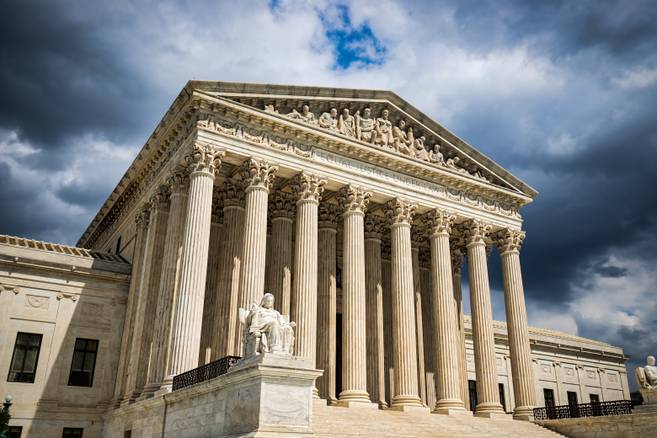
Like a lot of Black people existing and thriving in spaces where some are surprised to see us, I’ve been called an unqualified affirmative action hire who successes were given rather than earned. I have literally had people ask for my resume, to basically show them my papers to justify my presence. Nah.
A fellow Black woman journalist, MSNBC’s Joy-Ann Reid has dealt with that, too. Last week, in the aftermath of the Supreme Court decision that universities could no longer consider race as a factor for admissions, Reid said something refreshingly poignant — affirmative action absolutely got her into Harvard University.
That wasn’t because she didn’t belong there, but because being Black in a small Colorado town without an elite prep school or family connections may have ruled her out otherwise. Having a Harvard recruiter coming specifically to look for her helped bridge that gap. Local colleges have said they’re going to recruit diverse students even harder following the Supreme Court decision.
Reid’s story reminded me of the crusty baseball scout played by Jon Lovitz scouring the nation’s tiny towns looking for the best lady ballplayers in “A League of Their Own.” There were qualified people out there. You just had to find them.
“This was not the recruiter saying, ‘We’re going to take an unqualified person and put them in Harvard,’” Reid explained. “Rather, they were saying, ‘We’re going to take a very qualified person who we would never know existed and put them in Harvard.’”
I think much of the objection to race-based affirmative action is the lie that everyone in this country is on equal footing, opportunity-wise, and that Black people are just handed college admissions, free tuition and jobs because of their race. If that were true, the Black student population at Harvard, for instance, would be higher than about 6 percent of its enrollment. Also, if college was supposed to be free, I would like my money back. Run me my check, Sallie Mae!
Affirmative action was never meant to give anyone an unfair advantage, but rather to correct the unfair disadvantage that people of color and women faced. It tried to level a playing field that had been made jaggedly uneven and unwieldy by systematic racism, slavery, Jim Crow and segregation. It meant that doors that had been bolted shut for so long had to legally open. It meant consideration for the unevenness, like giving different weight to things like grading and standardized testing, was a fair way to bridge that chasm.
That’s all it was — trying to make things fair. Think about it: Some white people succeeded in part because their competition was legally barred from even showing up. And then there’s the children of donors and alumni of exclusive schools who are given preference in hopes that Mom and Dad might be moved to donate a building. According to data from a lawsuit filled this week that’s contesting legacy admissions as a violation of the Civil Rights Act, those students are 6 times as likely to be admitted to Harvard University than other students. And 70 percent of them are white.
Diversity isn’t just about having Black or brown or Asian faces in a space for the sake of just having them there. Race or gender doesn’t make you automatically a better reporter or doctor or teacher, but it can inform how you do what you do and where you do it. Kids thrive with teachers who understand them and may look like them. Black babies survive in larger numbers when treated by Black doctors. News organizations that cover communities of color should have some representation from those communities. This should not be controversial.
What Reid, and I, and most Black people I know have found, is that getting into those rarified spaces isn’t enough. You have to stay there, even as people challenge your worthiness, even when it’s hard. I remember getting into the University of Maryland at College Park, which was founded in 1856 but didn’t admit its first Black student until 1951, 20 years before I was born. An older Black lady at my church told my parents that I could simply not go there because it was well-known that we weren’t welcome there.
Sign Up for Alerts
Get notified of need-to-know
info from The Banner
I succeeded there, even with some stares — and a white guy who asked if I, who was 30 pounds overweight at the time, was there on an athletic scholarship about five minutes after we met. I think he couldn’t accept that my intelligence had gotten me into the same school he was at. Some affirmative action opponents have suggested that its ending is a good thing because now everyone will know we got there on our own merits. Oh, please. Those who are inclined to question the qualifications of minorities didn’t need affirmative action as an excuse. They called Barack Obama an affirmative action president, and he literally earned his spot by getting voted into office. Twice. Racists are wild.
When I was the music critic at the Palm Beach Post, more than a few readers told me I was an affirmative action hire who was given my job over some more qualified white man. This wasn’t true, and they didn’t have any proof of this, but it just seemed right to them. Also everyone who has a job was given it, because no one just shows up at an office with a box of staplers and a homemade nameplate, squats in a cubicle and says “I work here now. When’s payday?”
I’m very, very good at what I do, and that’s why I’ve sustained and excelled in my career. But like Reid, I can absolutely attribute to affirmative action an early opportunity that I probably wouldn’t have found if someone wasn’t looking for me. In 1993, not long before my graduation from Maryland’s College of Journalism (now the Merrill College of Journalism) I attended a minority job fair in Philadelphia.
At the time, I got absolutely no job offers and decided to move to Miami, where my parents lived, while plotting my next chapter. But the day I got off the train, I got a call from someone I’d met at that job fair, an editor at the York Dispatch in Pennsylvania, an hour north of my Baltimore home but in a conservative small town where I never would have looked for a job. I told her I wasn’t interested in moving back north so soon, but that I’d keep in touch. A year and a half later, I was there, becoming, at the time, the only Black reporter. It wasn’t about quotas, but about increasing the perspective of the newsroom in the best interest of the readership.
Thirty years after I met that editor, I am still in this career, writing books, speaking internationally and, most importantly, using my voice as a Baltimorean, veteran journalist and, yes, a Black woman. I am all of those things. And proud of it. I just hope the Supreme Court decision doesn’t end the search for people like me.





